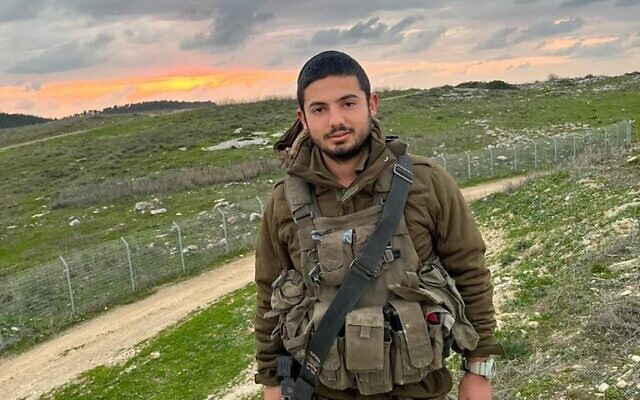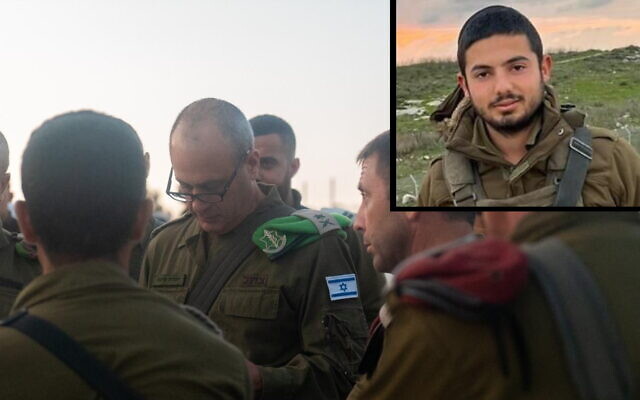Two days before an IDF soldier was shot dead by his comrade in an apparent friendly fire incident at a guard post, a similar incident occurred at the same spot, but ended without injuries though shots were also fired, Channel 12 reported Wednesday.
20-year-old Nathan Fitoussi was shot dead on Monday night after he returned to a guard post near the Palestinian city of Tulkarem and was misidentified as a threat, according to an initial probe.
According to the network report, there were wide-ranging problems in the unit that likely contributed to Fitoussi’s death.
The report cited a soldier serving in the same company as Fitoussi who told close acquaintances that poor nighttime visibility at guard posts was a known problem at the position where they were serving. Pleas for night vision equipment or better flashlights had gone unanswered, he said.
The soldier related that just two days before the fatal shooting other soldiers had fired shots when surprised by a friendly force.
Get The Times of Israel's Daily Edition by email and never miss our top stories
Describing the event, he said soldiers was pursuing a group of Palestinians who were apparently trying to infiltrate into Israel without work permits, a common occurrence.
He said there was no communication between the various guard posts and that at some point another group of soldiers, noticing the pursuing force, engaged them with the procedure for apprehending suspects, unaware that they were friendly forces, and even firing warning shots into the air.
In response to the gunfire, the soldiers shouted to identify themselves as IDF personnel, bringing an end to the incident without injury.
“Also in that case there wasn’t any night vision equipment or a flashlight,” the soldier was quoted as saying and noted that though it was reported to commanders the event was not investigated.
“If there was an investigation, they could have prevented the incident of Nathan,” the soldier claimed.
He reportedly explained to acquaintances that as soon as his unit arrived at the position where they were deployed soldiers complained about the poor visibility at guard posts.
There wasn’t enough night vision equipment to enough to go around “so a situation arose in which at many posts you couldn’t see a thing,” he reportedly said. Likewise, there were not enough flashlights and those that they were given were old and dim, he claimed.

Staff Sgt. Nathan Fitoussi in an undated photograph published by the military on August 16, 2022. (Israel Defense Forces)
The IDF said in a statement that the investigation opened into the fatal shooting “will examine the circumstances that led to the soldier’s unfortunate death. Upon completion of the investigation, the findings will be forwarded to the Military Prosecutor’s Office for consideration. At the same time, a team of experts was appointed to learn lessons.”
More details emerged on the fatal shooting that took Fitoussi’s life as the soldier who opened fire was interrogated and reenacted the shooting at the scene.
An initial probe into the case found that Fitoussi kept running towards the other soldier even after he was hit by the first bullet, the Ynet news site reported.
The soldier who shot him, who has only been identified by the first letter of his name in Hebrew, Aleph, fired eight bullets in total, some into the air as a warning shot.
But after his first bullet hit Fitoussi, the wounded soldier kept running toward him, prompting Aleph to fire again, hitting Fitoussi in the chest.
Fitoussi managed to say “It’s me,” before collapsing, the report said.
It was only then that Aleph realized he had opened fire on his comrade and called his commanding officers, telling them “I shot Fitoussi, I shot Fitoussi.”
Attorneys for the Aleph said he is cooperating with the probe and that on Wednesday night he reenacted the shooting for investigators at the guard post where it happened.
But they also demanded that the investigation be halted and accused prosecutors of trying to physically and mentally wear him down until he says something that can be used against him.
In a statement attorneys from the Military Advocate General said Aleph “was interrogated for long hours.”
“We understand the great importance of a thorough and proper investigation of the terrible event and the importance of an exhaustive investigation of its circumstances. But it is also not possible to accept such a long investigation under such difficult conditions,” the statement said.
“It seems that the whole purpose of the prolonged investigation is to take advantage of the young soldier’s difficult situation and hope that he will trip up in his statement and change his version according to which he acted in accordance with the orders he received and in accordance with the circumstances that existed at the time.”
“The soldier answered all the questions asked by his interrogators and there is no longer any point in repeating the same questions endlessly when he is in a difficult mental state, exhausted and grieving,” attorneys said.
The attorneys also lamented “inaccurate information” leaked to the press from the probe saying it “damages the confidentiality of the operational investigation, damages the IDF’s ability to learn from future investigators, and damages the soldiers’ trust in the investigative institution.”
“We call on the media and the public on social networks to wait for the end of the investigation and to exercise the necessary restraint in these tragic circumstances,” the said.

Head of the IDF’s Central Command, Maj. Gen Yehuda Fuchs, tours the site where Staff Sgt. Nathan Fitoussi (insert) was killed in a friendly fire incident, near the West Bank city of Tulkarem, August 16, 2022. (Israel Defense Forces)
According to the IDF’s preliminary probe into the killing, the shooting soldier followed the military’s open-fire procedures. Those include shouting at a suspect to halt, firing into the air and only using deadly force if the soldier feels threatened.
Fitoussi told his comrades in a guard position near Tulkarem that he was going to pray and would return a short while later. But when he returned, his comrade “shot him after an arrest procedure, which included shooting into the air and at the legs,” military spokesperson Ran Kochav told Kan public radio on Tuesday morning.
The two were standing several meters apart during the late-night shooting, according to the initial probe. Fitoussi was shot twice, and it was unclear why he was misidentified as a threat.
According to an unsourced Channel 12 news report on Tuesday, one of the possible explanations being investigated is that Fitoussi had heard Aleph’s yells, thought they were directed at a different suspect and was running to help him.
the probe is seeking to determine how the fatal misunderstanding unfolded, why the shooter identified Fitoussi as a suspect when he knew Fitoussi had left to pray and was due to come back, and why Fitoussi hadn’t stopped or followed his comrade’s orders to identify himself.
Fitoussi’s parents harbor no resentment toward the soldier who fatally shot their son, a family friend told reporters Tuesday.
The Military Advocate General issued a statement on behalf of the soldier earlier in the week, saying he had “followed orders and instructions.”
Earlier this year, two IDF officers from a commando unit were killed in a friendly fire accident at a base in the Jordan Valley in the West Bank.


